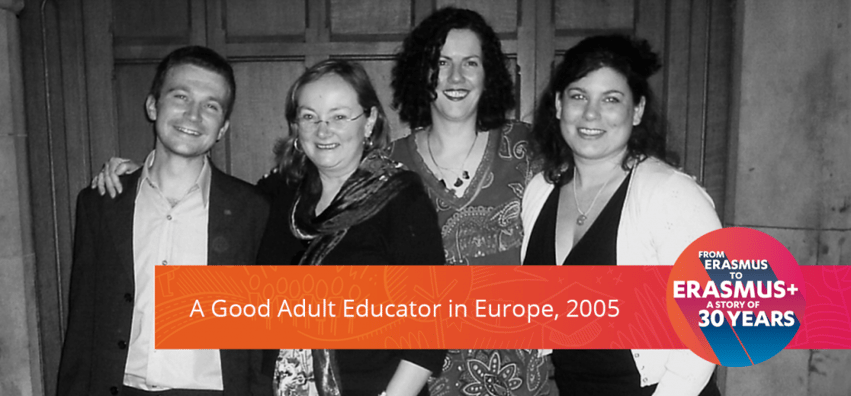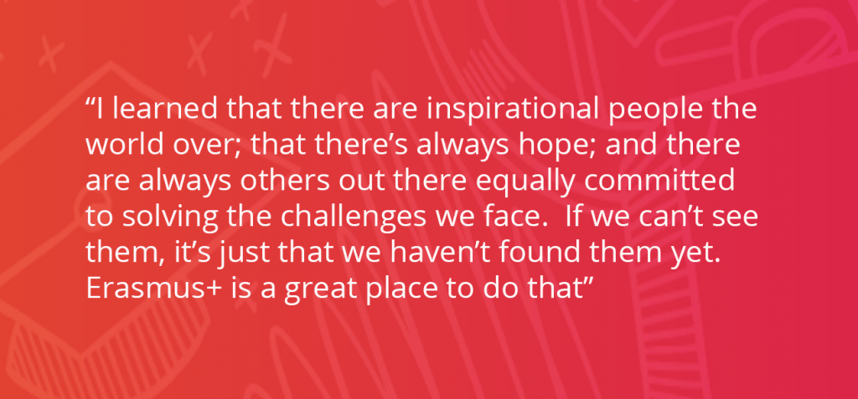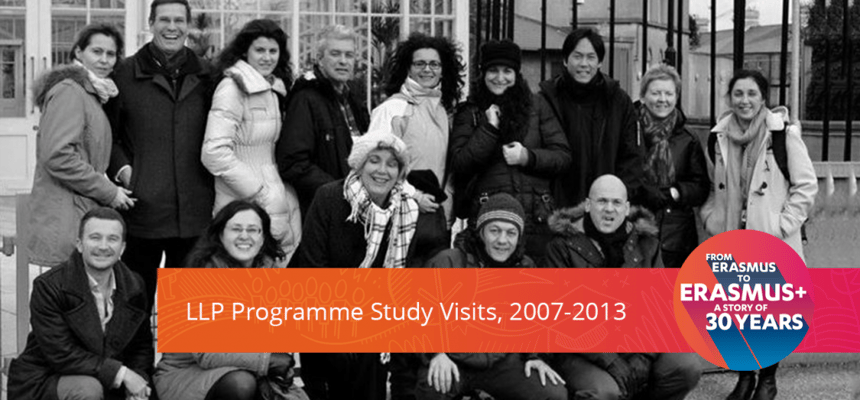My Erasmus+ Experience
Brian Desmond is a member of the Communications team in Léargas. As part of our "Erasmus+ 30" series he tells us about his Erasmus+ experience both as a participant and a staff member of Léargas. If you’d like to share your experience we’d love to feature you. Get in touch with us today!
What does Erasmus+ mean to you?

I’ve always loved learning. I’ve always believed in it and I’ve always believed it never stops. I’ve always believed that if we come together with open minds, there’s no limit to what our shared experience can teach us. Or have I always believed that? The truth is that it’s my involvement in adult education and European programmes that has brought me to this view of life. In many ways, Erasmus+ is one of the experiences that changed how I fundamentally view the world and my place in it. So in short, it means a lot.
When did you get involved in Erasmus+?

I first encountered Erasmus+ in 2005. Back then it went by the name of Grundtvig and was part of the Socrates programme. I was working in the Department of Adult & Community Education in Maynooth at the time.
I remember my colleague and friend Bríd Connolly asking me if I wanted to get involved in a project called "A Good Adult Educator in Europe". I had already made plans to move abroad to Latin America the following year but it sounded good to me. I’d get to meet peers from across Europe and work on a passion of mine alongside a colleague I really respected. I had no idea about all the other things it would offer. I had no idea I was opening myself up to something life-changing.

What did you learn from your Erasmus+ experience?
I learned that there are inspirational people the world over; that there’s always hope; and there are always others out there equally committed to solving the challenges we face. If we can’t see them, it’s just that we haven’t found them yet. Erasmus+ is a great place to do that.
I got to know like-minded people from all over Europe. It was amazing. Everything that I believed in, everything I’d thought about and read about in theory was unfolding around me. I was experiencing all the things I’d studied and dreamed.
One of my heroes, Myles Horton, said that if he had to put his finger on what he considered “a good education, a good radical education, it wouldn’t be anything about methods or techniques. It would be loving people first”. Being part of that project brought that to life for me. I felt connected with people on a level that went beyond borders or language. My perception of what education could be and who I was as a citizen of the world expanded. I was changed forever.

How has Erasmus+ informed your work?
Working in a National Agency as I do, means that Erasmus+ informs so much of the work I do. Before my current role in Communications, my colleague Ivanna D’Arcy and I worked on Study Visits. The Study Visits initiative was the Lifelong Learning Programme strand for policy makers. We’d send Irish education policy makers on study visits across Europe. We sent close to 400 Irish policy makers on those visits abroad. We also hosted over 40 Study Visits in Ireland. European policy makers came to learn from the best organisations in Ireland, and we were fortunate enough to connect them.
We visited schools. We toured training centres. We pulled up in our rickety old coach and were welcomed in community centres and job centres. We dined in hospitality colleges and had cups of tea in neighbourhood flats.

I learned so much during those Study Visits. To quote Myles Horton again, “If you’re going to work with small groups and your aim is to change society, and you know that you need masses of people to accomplish that, you have to work with those people who can multiply what you do”.
Study Visits taught me that it is essential to reach the ‘multipliers’ to effect change. It’s essential to bring them together so they can bring about a change at a structural level and make a real difference to people’s lives.
Study Visits also taught me that it’s equally important to remember that ‘policy makers’ are people too; and people first. When we connect at a human level we can bring about true transformation and can really bring about the changes we seek in our societies and our world.
What are your hopes for Erasmus+ in the future?
My hopes for Erasmus+ are the same as my hopes for Europe. I hope that the like-minded people I’ve met over the years continue to speak truth to power in their own countries and Europe. I hope that they are joined by a new generation empowered to shape policy so that it works for everyone, includes everyone and leaves no one behind.
I hope Erasmus+ remains about real people and stays connected with the realities on the ground. I hope that the spaces for participative democracy grow to effect real change at the highest levels. For me the work of youth groups involved in Erasmus+ KA3 ‘Structured Dialogue’ projects is something that embodies this and really fills me with hope for the future.
I’m indebted to the great people I’ve worked with over the years. I’ve learned from each and every one of them and my hope for Erasmus+ is that it continues to give voice to their wisdom and insights, and never falters in supporting ‘learning’ and education in the broadest of senses.
I guess to come full circle, who better to quote when summing up my hopes for the future, than the person who started me on my Erasmus+ journey: my friend Bríd Connolly. I hope that it “helps people to feel that they are wonderful members of society rather than simply workers. That is very much a part of the story of adult education; it really is about the development of the human spirit and our citizenship and it must help us to fight the kind of takeover of adult education for purposes that do not enhance the human spirit. Let this be the future; to really enhance the human spirit”.
We welcome contributions to Insights at comms@leargas.ie
